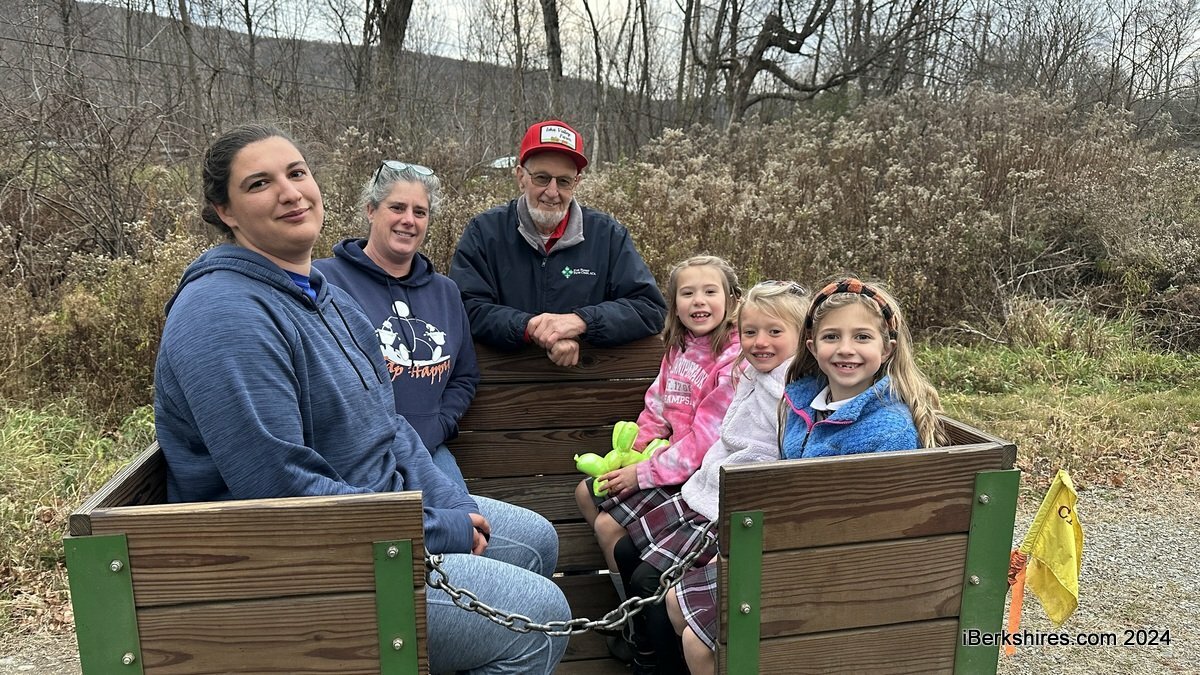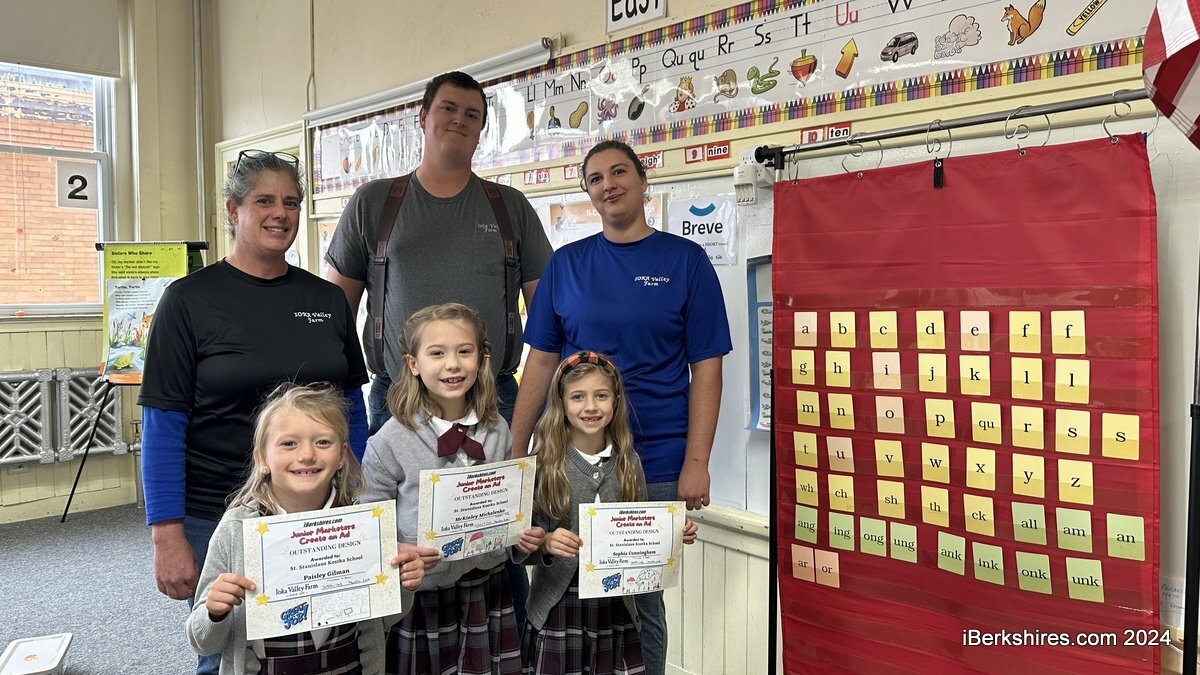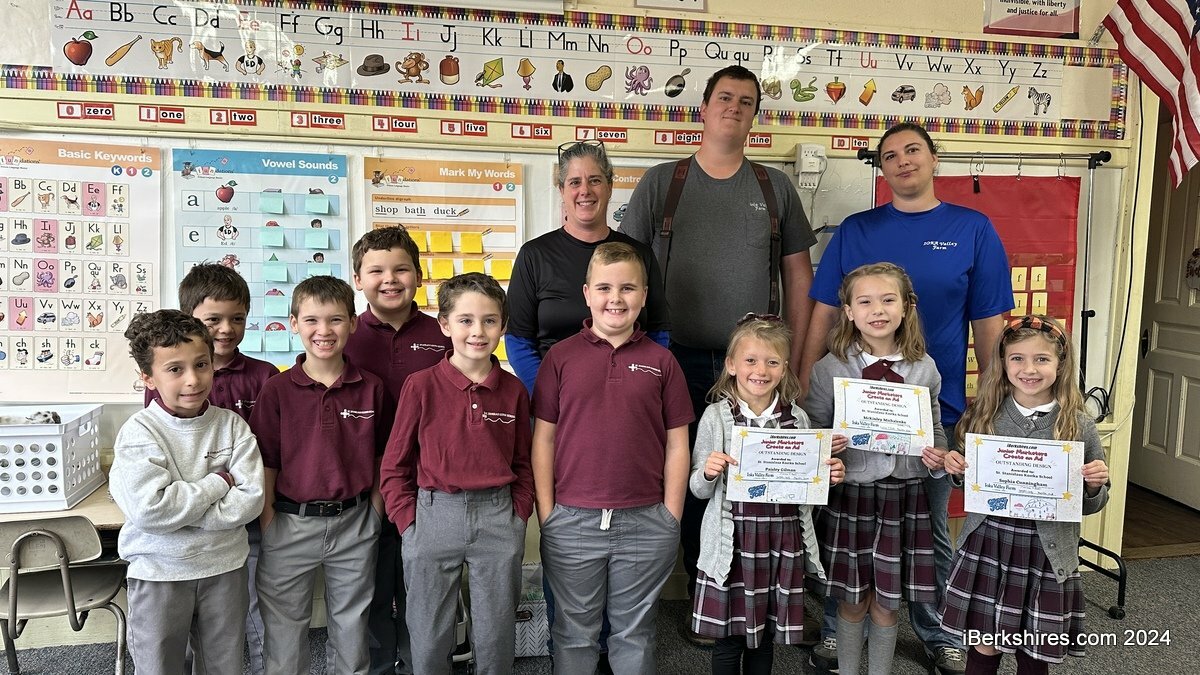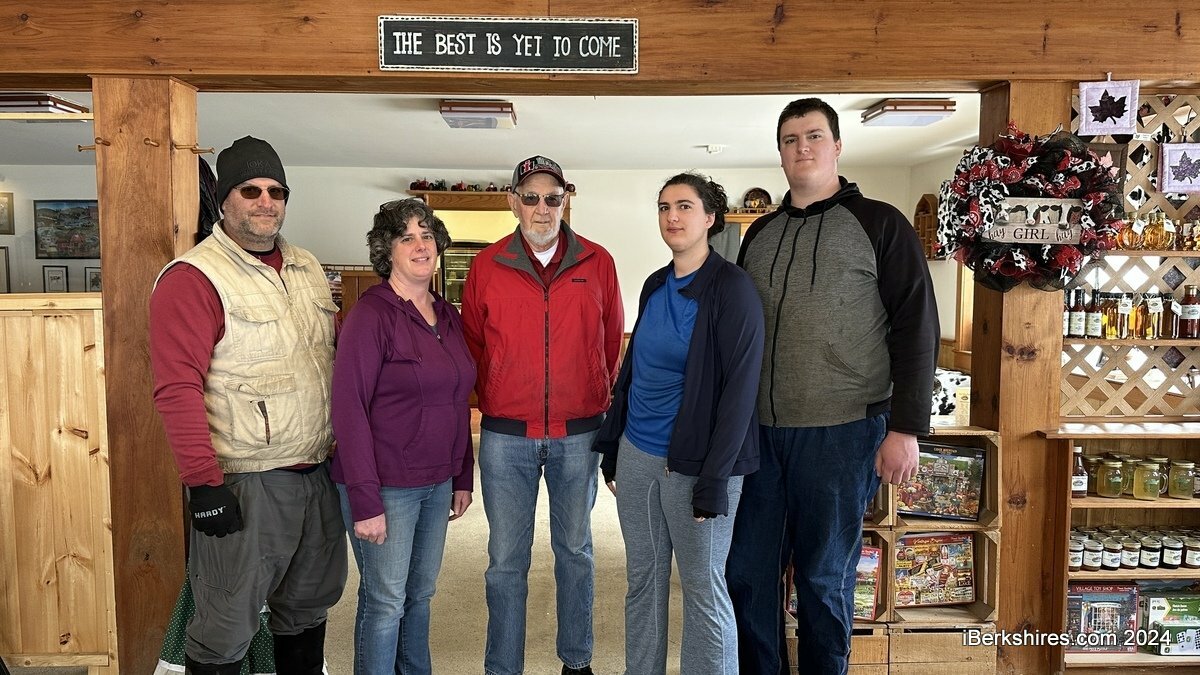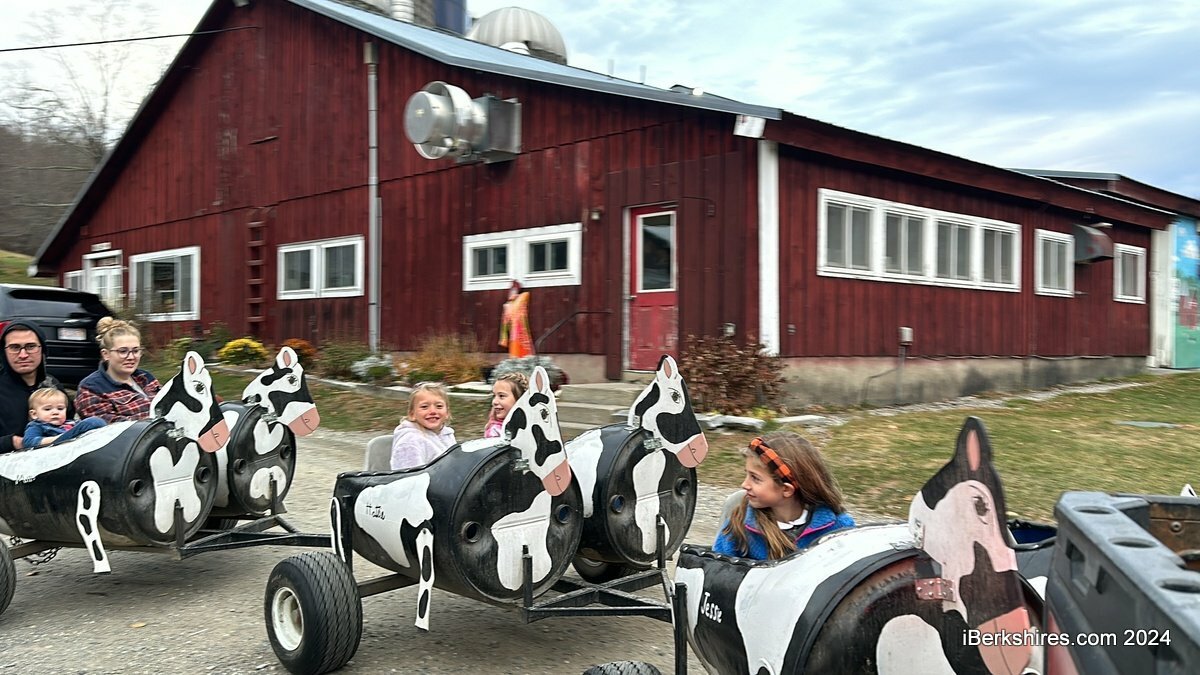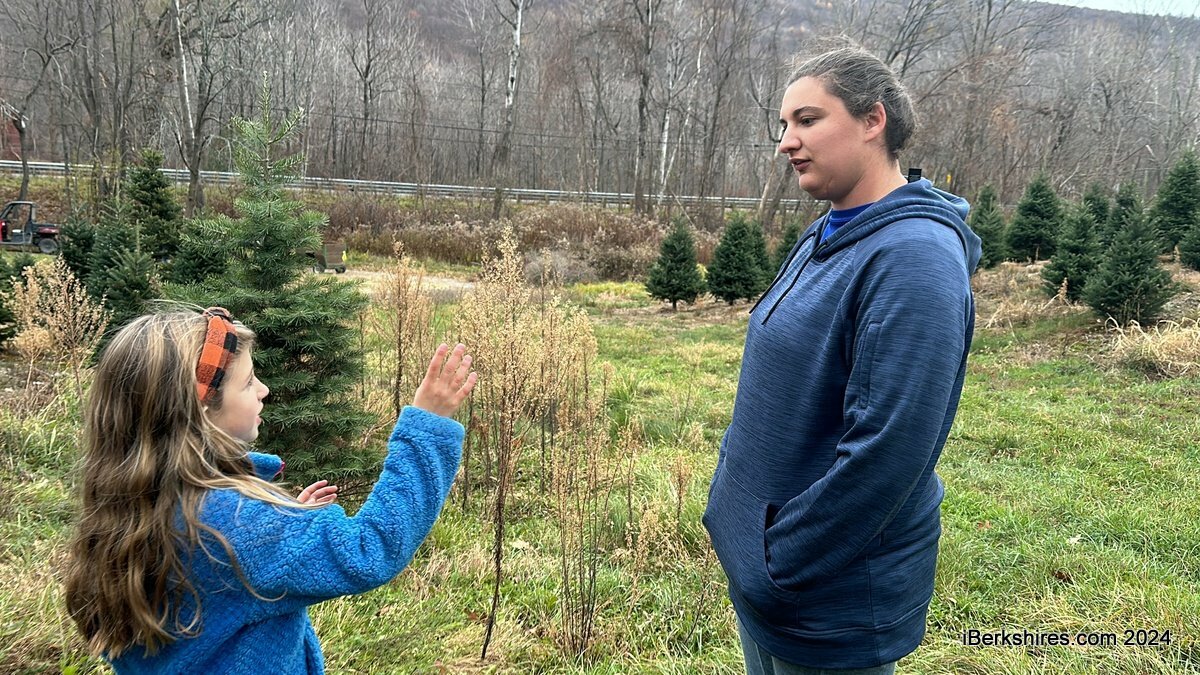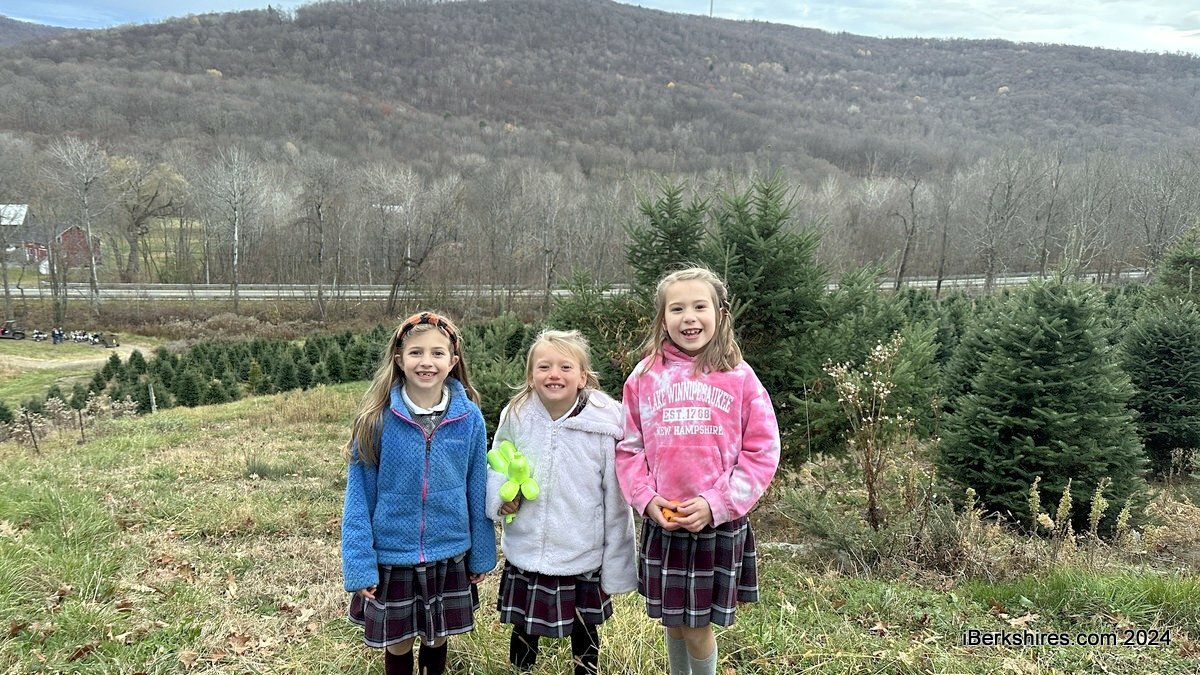
Junior Marketers: Ioka Valley Farm
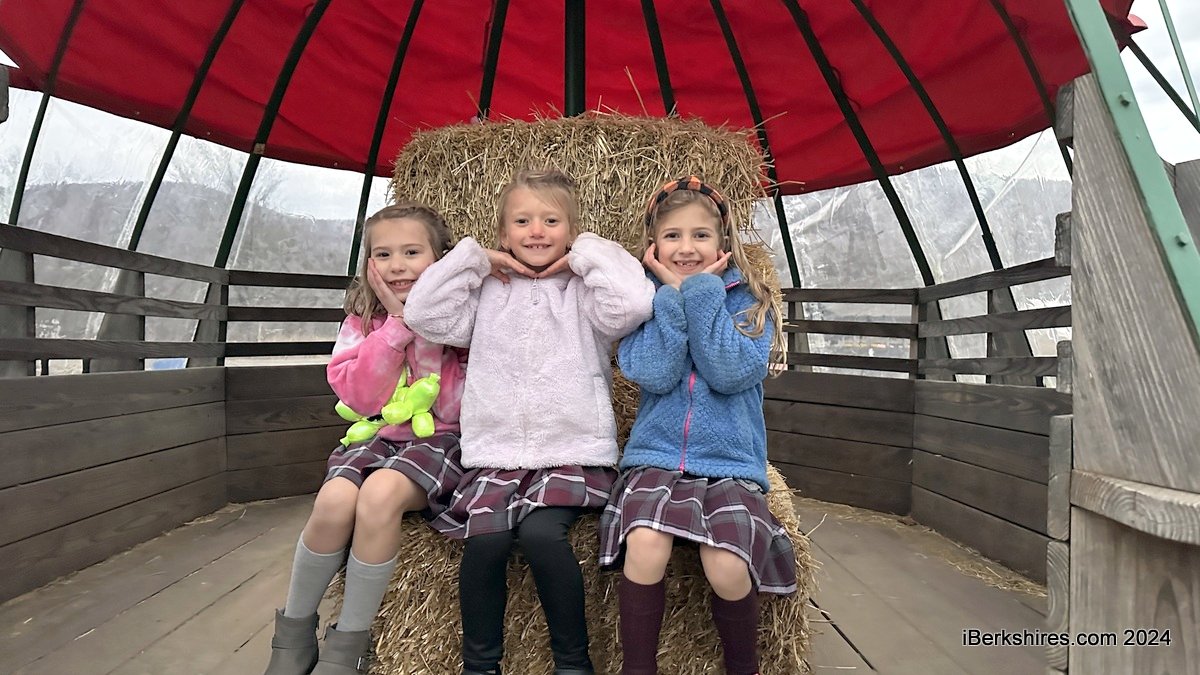
McKinley Michalenko, Paisley Gilman and Sophia Cunningham got to visit the farm on Monday.
We contacted Berkshire County teachers and asked their students to help create an ad for our sponsors and the community delivered. For the next 11 months, we will showcase ads made by our creative next generation.
This month, students depicted life at the four-generation family-owned and operated Ioka Valley Farm at 3475 Hancock Road, specifically highlighting its winter season when they sell Christmas trees.
Generations of families have visited the 500-acre farm to acquire locally grown products, including pumpkins, jams, Christmas trees, and maple products.
The farm has been selling Christmas trees every winter since 1994. Second-generation owner Don Leab and his cousin planted their first trees in 1986.
Every weekend from Thanksgiving to Christmas between 9:30 a.m. and 4:30 p.m., families can look forward to riding a trailer decorated as a Santa hat to a grove of trees and selecting their favorite one for their holiday celebrations. The farm also offers fresh-cut trees at its farm stand.
On Fridays, from noon to 4:30 p.m., the gift shop and farm stand will be open. You can purchase fresh-cut tree wreaths, handcrafted decorations, gifts, pure maple syrup, and specialty maple products.
The farm offers three varieties of trees: concolor, Fraser and Canaan firs. There are 15,000 trees on 15 acres.
On Dec. 7 and 8, the farm will be hosting breakfast with Santa from 8 to noon.
Some of the farm's owners, Melissa, Josh and Martha Leab, visited the Adams school to meet the students who crafted their ads and presented the winners with a certificate.
The students they selected as the winners for their outstanding design were McKinley Michalenko for first place, Sophia Cunningham for second, and Paisley Gilman for third.
"Each ad was very different, and each one had a really unique piece that you would have loved to have pulled them all apart and put it together because each child had a slightly different focus and their own unique style," Melissa said.
"So it was really neat to see how different they were, but yet they did follow what was asked for a Christmas ad."
Many of the students highlighted the farm's hot chocolate and apple cider doughnuts, she said, and Martha added that most of the students' drawings had snow in the pictures.
McConnell said she was impressed with what the students came up with because many of them have seen advertisements on television, but making an ad is a whole different situation.
"As a Catholic school, Christmas is a huge part of our academic experience. It's a huge season for us. It's a time of celebration. So, I think talking about the Christmas tree farm, that's another aspect of Christmas — that people celebrate, and it's a fun family tradition," McConnell said.
"I think I was just surprised at the details that they came up with, and making it not only as part of the winter season itself, but making it sort of a cozy atmosphere, and talking about what an advertisement was.
McKinley drew trees, a detailed sign showing some sweets for sale, and some goods for sale under a tent, including donuts and hot chocolate.
Cunningham highlighted the sweets under the tent and drew her trees on rolling hills and a red tractor.
"Most of them had a red tractor. And we have red tractors, so they did good on that," Josh said.
Gilman drew a snowy winter day at the farm. Showcasing a brown tractor pulling freshly cut trees in a trailer.
"We were thrilled when [the series was] brought to us to try because to see the world through children's eyes is always amazing, and it's always been very interesting to me to see what they take away when they even come to the farm," Melissa said.
"And for me, having families come and watching the children and paying attention to the children's experience is a focus that I try to do as they come. So, this was a really neat opportunity to pull the children in and let them be a part of what we do."
After school, the winners went to the farm with their families to see their drawings come alive.
They rode the farm's cow train ride, which was driven by uncle Don. Stopping in one of the farm's groves, Don answered some of the students and their families' questions, including the Christmas tree cutting process and how long it takes to grow.
"We plant the trees in the spring, and it takes about eight to 10 years before they're big enough to cut for a Christmas tree," Don said.
Not every tree they plant will survive, so they plant about 1,500 trees a year, give or take, and count the number that were cut down to determine how many they will need, Melissa explained.
Martha ran up the rolling hills with the winners and talked about the different kinds and sizes of trees and what they smell like in the winter.
When she explained how the concolor fir has a more citrusy smell, they excitedly ran over to smell one.
Martha said some of the trees they sell can grow up to 16 feet and helped the students visualize that using examples from what they see and already know, such as the height of herself and her brother.
The girls then ran up to a small tree to see how much taller they were compared to it.
They ran up the hill overlooking the farm and waved to their parents from top, commenting that they looked as small as ants or toys.
During their visit to the school, the Leabs answered some of the students' questions centered around the farm's products, animals, and farming operations and equipment.
One student asked how they get the food to feed their animals and was excited to learn that the hay and the corn are grown and harvested on the farm and the other nutrients they get from an animal feed store to help supplement.
Josh also explained the difference between straw and hay.
"Cows will eat hay, which is like grass, like the lawn in your backyard. [If you let the grass] grow really tall and then cut it and dry it out, it's called hay, and that's what the cows eat," he said.
"Straw is actually what they use [to] sleep on. They sometimes eat it, but it's not very nutritious for them. They spend most of their time sleeping and standing in the straw."
They also explained how the cows on their farm are raised as beef cattle, which is like the meat they would get at the store. They have about 30 cows.
"We do the fun part. We get to take care of them and give them an excellent place to live and eat until they're ready for market," Melissa said.
McConnell said having the students to meet the owners of Ioka Valley Farm allows them to see how farming is vital to America. Having them create an ad for a business also gives students the opportunity to feel part of their community.
"Berkshire County is very fortunate. We have lots of farms, they are smaller in size than traditionally thought of and [what people are] exposed to, but we still have a lot of farms [and] a big, strong farming community. People have the ability to seek out local food and local products directly from the farmer. [There are] tons of farmers markets from one end of the county to the other,"
"'Buy Local' is very strong. So, being a part of that is exciting. We really want people to know and learn where their food and products come from. That's very important because there's lots of children and people who just really think food comes from the grocery store, and if it's not on the shelf, they don't know where else to look for it."
A Brief History of Ioka Valley Farm
Robert and Dorothy Leab opened the farm in 1936 after driving "13 head of cattle over Brodie Mountain" from Lanesborough.
The land previously labeled as a "poor farm" due to its "worn-out soil" became a success thanks to "sustainable farming in soil conservation, water conservation, and forest management" practices.
After finally convincing his parents to sell him the farm, Don Leab revitalized it, bringing the passion for farming that his parents no longer had. He juggled several ideas, and over time, the farm developed with the family's changing passions and knowledge, diversifying with the current economy and demand.
In 1986, he formed a partnership with a cousin who was a forester and started to plant Christmas trees.
In 1996, the dairy herd was sold so that the farm could focus more on diversifying by growing pumpkins, strawberries, and the trees.
Don and Judy Leab also started the educational program by bringing school groups to the farm so children could learn how plants grow.
When they started diversifying, the goal was to encourage people to visit the farm to purchase products while also allowing visitors to see the operation and learn a little about agriculture.
Don and Judy's son, Robert, and his wife, Melissa Leab, joined as business partners in 1996 and are integrating their kids, Josh and Martha, into the leadership role.
View All Junior Marketers Create an Ad Drawings Here
View All Junior Marketers Create an Ad Drawings Here
Tags: Christmas tree, farming, junior marketers,

